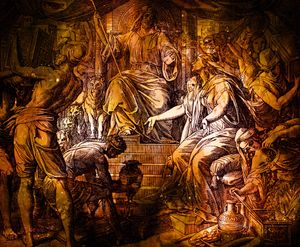It is interesting that King Solomon, the wisest, richest sovereign to that date, wrote a rather bitter lament about the meaninglessness of life. He could sing along with Mick Jagger with feeling and gusto. “I Can’t Get Nooooo Satisfaction.” He had too much of everything but couldn’t find happiness. This would be like the Kardashians complaining about not getting enough attention.
Solomon applied a sheen of respectability to a season of sex, drugs, and rock n roll by calling it an experiment. Solomon said yes to everything or, rather, never restrained himself from any pleasure, indulgence, or acquisition. It must not have seemed a moral issue; it was science because he took notes and published a paper on the findings.
That paper is the book of Ecclesiastes. As King David’s son, the author, Solomon, had the resources to do just about anything - like Elon Musk. Given supernatural brain power and rest from enemies, Solomon had the wisdom to accomplish his goals. He decided to seek fulfillment.
He sought it in being a perpetual student: not there. He sought it in pleasurable living (1,000 wives - you do the math): not there. He sought it in world-class entertainment: not there. He sought it in building five-star palaces and resorts: not there.
His older self concluded all his mega-wealth and his experiences - from enlightenment to debauchery, were vapor; a quick breath. He had chased the wind, grasping for something that could not be held.
Yet in three places, Solomon instructs nothing is better for us than to find satisfaction and enjoyment in our work and to be sustained by it (eat and drink). (See Ecclesiastes 2:24, 3:12-13, 5:18-20.)
This is puzzling to me. Did he not find joy and fulfillment in his work and the fruit of it because of the massive scale? Was it unsatisfying because he expected more from such immense outlays? Was it ultimately distasteful because of excess?
Or did Solomon realize that most of us are destined to live ordinary lives by comparison and should find fulfillment in simple things? In his paper, he talks of marriage, friendship, the pursuit of excellence, sweet sleep after hard work, and delighting in the wages of labor.
Another question I have: Does Solomon’s instruction mean to find work that makes you happy, or is it to find out how to be happy in the work you are doing…or both? Today we enjoy modern challenges humanity did not wrestle with historically; most were in compulsory jobs with no options.
The stonecutters working in Solomon’s quarry may have read his paper with a jaundiced eye while on a gruel and water power lunch and then, feeling hapless, resumed sawing. A few, though, may have taken the message to heart and began to see the joy of teaming up with other burly men, became thankful for a body fat percentage score of zero, gave grace and relished dinner, and fell into a deep sleep that night feeling proud of their precision cuts. They chose to be happy.
In the above verses, “enjoy” means see, understand, reveal, look at, examine, or inspect. There is a clear connotation of finding joy in our work and doing it with all our might. (Ecclesiastes 9:10)
But nothing forbids us from seeking fulfillment in our work - as did Solomon. But we can do it armed with reasonable expectations and his cautions. (The clearest lesson from Solomon’s lament is understood from the theme of all scripture. True fulfillment is spiritual and cannot be achieved from the physical alone.) Since many modern men and women are, by comparison to former times, gifted, educated, rich, and free - should we not seek work we enjoy? Yes, absolutely! We simply will not get the fullness of joy from work not aligned with our unique gifts and passions.
Solomon concludes the whole duty of man is to reverence God and keep his commandments. Interesting because scripture shows Solomon’s foreign wives turned his heart from God. I hope putting his thoughts to papyrus helped him turn back at the end.
Let’s follow through and get joy and fulfillment from our work.





